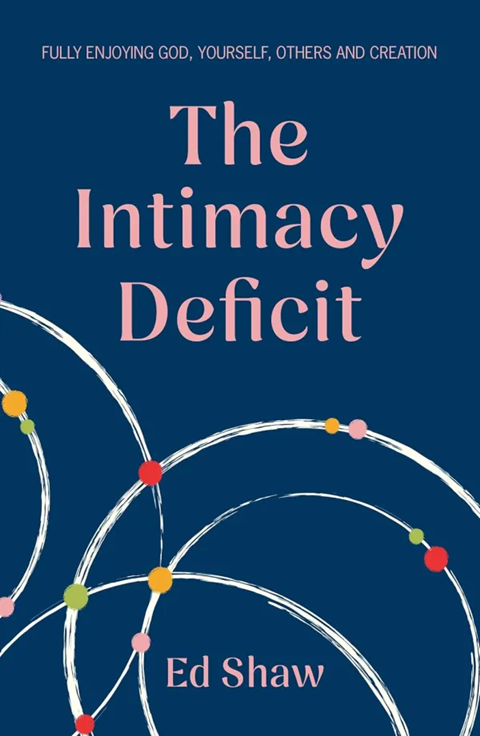In The Intimacy Deficit, Ed Shaw redefines intimacy as something far deeper than sex – offering a rich, biblically grounded vision of connection with God, self, others and creation. It is a hopeful, practical book a much-needed guide for addressing the relational disconnect so many experience today, says Rachel Bedford

When I received a copy of this book to review, my first reaction was an eye-roll: “Not another Christian book about sex.” However, Ed Shaw’s opening line immediately squashed those assumptions: ”This is not a book about sexuality and/or sex.” Instead, the book centres on a conviction that the “greatest need in life is intimacy - a sense of oneness and connectedness both beyond yourself and within yourself, but not of the sexual kind.”
The thinking and pastoral praxis behind The Intimacy Deficit (Inter-Varsity Press) has been many years in the making, evidenced in its clear structure and lean writing style. The author has allowed these ideas to shape his own life and ministry, and each chapter beautifully – and challengingly – reveals that despite his celibacy, Shaw leads a deeply intimate life. The book is divided into four distinct sections, each explaining that we need intimacy with God, ourselves, others and creation. Like the very best sermons, for those of us seeking deeper intimacy in our lives, Shaw clearly and biblically explains the why before landing in the how.
In a masterful use of his teaching gift, the author suggests we ‘adopt Psalm 23’, walking readers through 14 distinct ways to creatively engage with scripture to strengthen our intimacy with God. His suggestion that I paint, imagine or update the psalm, inspired me to think far more expansively about the possibilities of my own devotional life.
Shaw’s lived experience, as a single, same-sex attracted man, shapes the book throughout. He writes movingly about people he pastors: “all the big problems people have entrusted me with - their broken relationships, painful loneliness, powerful addictions, crippling anxieties - are nearly always down to an intimacy deficit in their lives: a lack of closeness, oneness and connectedness to God, themselves, others or creation”. Added to this, Shaw’s vulnerability is refreshing in a book of this kind and he shares openly about his own pain: “[when] I look in the mirror each morning I see the weary look of a middle-aged man in a body I’ve often struggled to love, but God says that I see someone who is like him, who belongs to him….For me, experiencing and enjoying intimacy with myself has meant connecting with some of my greatest wounds and recognising them, for good or ill, as part of me.”
In my experience, church leaders - the majority of whom are heterosexual and married - do not excel at teaching congregations how to nurture deep friendships. In contrast, Shaw’s insights on this are exceptional and chapters five and six are some of the best writing on friendship I have ever read. The author has evidently learned not just how to build and maintain intimate friendships but how to teach and mentor others in this. Drawing widely on scripture, tradition and his own experience – Shaw casts a beautiful vision for intimate friendship, including the importance of healthy, non-sexual friendships with those of the opposite sex.
Shaw’s insights are compelling, particularly his exploration of the intimate friendship between Jesus and Mary Magdalene. He notes that Mary hugs Jesus in John 20, suggesting that: “touch is a natural part of their close relationship….she has clearly been held by him before”. Regardless of whether readers agree or disagree with this claim – it is refreshing to see it made by a leader in a church subculture which often condemns, rather than celebrates, close friendships with those of the opposite sex. Personally, I valued the encouragement that: “good, appropriate opposite-sex friendships should be part of all our lives today” and his uncompromising challenge to leaders like myself that: “you shouldn’t be in ministry if you aren’t enjoying friendship yourself”.

The final section of the book focuses on intimacy with creation. It was striking to read Shaw reflect on aspects of evangelical theology where: “Christians see everything in this world as an ungodly distraction”. Lamenting the habit of ‘completely eclipsing’ God’s creation mandate in Genesis 1 with the Great Commission of Matthew 28, he builds a strong case for recognising: “continuity between this world and the next” as we seek greater intimacy with the created world God has made for our enjoyment.
The book closes with a helpful ‘intimacy audit tool’, which could be used both for individual reflection or corporately in small group contexts. The author helpfully distils his ideas into questions to generate thinking around how well we are connecting with God, ourselves, others and creation. While this title opens with a seemingly insurmountable problem, it is deeply hopeful and uplifting in the biblical vision of intimacy it captures. It left me equipped with a plethora of actionable steps to help rectify my own intimacy deficit and that of the church I lead, and I imagine its ideas will shape my thinking for years to come.







































No comments yet